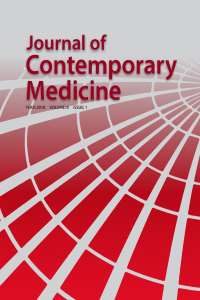Erken pandemide SARS-COV-2 tedavi protokollerinin karşılaştırılması: Türkiye'de tek merkez deneyimi
COVID-19, favipiravir, hidroksiklorokin, azitromisin, antibiyotikler
Comparisons of treatment protocols for SARS-COV-2 in early pandemic: Single center experience ın Turkey
COVID-19, favipiravir, hydroxychloroquine, azithromycin, antibiotics,
___
- 1. https://www.cdc.gov/coronavirus/2019-ncov/index.html [Accessed date: 01.March. 2021].
- 2. Turkish Republic Ministry of Health Covid-19 Guideline (https://covid19bilgi.saglik.gov.tr/depo/rehberler/COVID-19_Rehberi.pdf) [Accessed date: 01.March. 2021].
- 3. https://www.who.int/emergencies/diseases/novel-coronavirus-2019/situation-reports/[Accessed date: 01.March. 2021].
- 4. Sun J, Deng X, Chen X, et al. Incidence of Adverse Drug Reactions in COVID-19 Patients in China: An Active Monitoring Study by Hospital Pharmacovigilance System. Clin Pharmacol Ther. 2020;108(4):791-7.
- 5. Md Insiat Islam Rabby. Current Drugs with Potential for Treatment of Covid-19: A Literature Review. J Pharm Pharm Sci. 2020;23(1):58–64. 6. Zhou F, Yu T, Du R, et al. Clinical course and risk factors for mortality of adult inpatients with COVID-19 in Wuhan, China: a retrospective cohort study. Lancet 2020;395(10229):1054-62. 7. Şener A. COVİD-19 (SARS COV-2) Tedavisi. J Biotechinol & Strategic Health Res. 2020; 4: 97-104.
- 8. Arapović J, Skočibušić S. The first two months of the COVID-19 pandemic in Bosnia and Herzegovina: Single-center experience. Bosn J Basic Med Sci. 2020;20(3):396-400.
- 9. Furuta Y, Komeno T, Nakamura T. Favipiravir (T-705), a broad spectrum inhibitor of viral RNA polymerase. Proc Jpn Acad Ser B Phys Biol Sci. 2017;93(7):449-63. 10. Joshi S, Parkar J, Ansari Aet al. Role of favipiravir in the treatment of COVID-19. Int J Infect Dis. 2021;102:501-8.
- 11. Ghasemnejad-Berenji M, Pashapour S. Favipiravir and COVID-19: A Simplified Summary. Drug Res (Stuttg). 2021;71(3):166-70.
- 12. Sreekanth Reddy O, Lai WF. Tackling COVID-19 Using Remdesivir and Favipiravir as Therapeutic Options. Chembiochem. 2021;22(6):939-48.
- 13. Simonis A, Theobald SJ, Fätkenheuer G et al. A comparative analysis of remdesivir and other repurposed antivirals against SARS-CoV-2. EMBO Mol Med. 2021;13(1):e13105.
- 14. İzci-Çetinkaya F, Karagöz H, Yıldız O. Comparison of liver safety of favipiravir and hydroxychloroquine in COVID-19 treatment. Klimik Derg 2020; 33(3): 235-40.
- 15. Doğan E, Alkan-Çeviker S, Vurucu S, et al. [Investigation of the frequency of adverse effects in patients treated with favipiravir as SARS-CoV-2 treatment]. Klimik Derg. 2021; 34(2): 95-8.
- 16. Wang M, Cao R, Zhang L, et al. Remdesivir and chloroquine effectively inhibit the recently emerged novel coronavirus (2019-nCoV) in vitro. Cell Res. 2020;30(3):269-71.
- 17. Liu J, Cao R, Xu M, et al. Hydroxychloroquine, a less toxic derivative of chloroquine, is effective in inhibiting SARS-CoV-2 infection in vitro. Cell Discov. 2020;6:16.
- 18. Mutlu O, Uygun İ, Erden F. Koronavirüs Hastalığı (COVID-19) Tedavisinde Kullanılan İlaçlar. KOU Sag Bil Derg. 2020; 6(3): 167-73.
- 19. Borba MGS, Val FFA, Sampaio VS, et al. Effect of high vs low doses of chloroquine diphosphate as adjunctive therapy for patients hospitalized with severe acute respiratory syndrome coronavirus 2 (SARS-CoV-2) infection: A randomized clinical trial. JAMA Netw Open. 2020; 3(4): e208857
- 20. Gautret P, Lagier JC, Parola P, et al. Hydroxychloroquine and azithromycin as a treatment of COVID-19: results of an open-label non-randomized clinical trial. Int J Antimicrob Agents. 2020;56(1):105949. DOI: 10.1016/j.ijantimicag.2020.105949.
- 21. Seyhan AU, Doganay F, Yilmaz E, et al. Investigation of QT Prolongation with Hydroxychloroquine and Azithromycin for the Treatment of COVID-19. J Coll Physicians Surg Pak. 2020;30(10):153-7.
- 22. Gedikli MA, Tuzun B, Aktas, A et al. Are clarithromycin, azithromycin and their analogues effective in the treatment of COVID19? Bratisl Lek Listy. 2021;122(2):101-10.
- 23. Réa-Neto Á, Bernardelli RS, Câmara BMD, et al. An open-label randomized controlled trial evaluating the efficacy of chloroquine/hydroxychloroquine in severe COVID-19 patients. Sci Rep. 2021;11(1):9023. DOI: 10.1038/s41598-021-88509-9.
- 24. Wang M, Liao Z. SARS-CoV-2 and COVID-19: How much do we know? Acta Virol. 2020;64(3):288-96.
- Yayın Aralığı: Yılda 6 Sayı
- Başlangıç: 2011
- Yayıncı: Rabia YILMAZ
Baş Ağrısı Olan Covid-19 Hastalarında Crp/Lenfosit Oranı
Şaziye Melike IŞIK, Meltem KARACAN GÖLEN, Dilek YILMAZ OKUYAN
Burcu İLERİ FİKRİ, Alev ÖZTAŞ, Ezgi Direnç YÜCEL, Mesut AYER, Güldem TURAN
Acil Serviste İleus Tanısı Alan Hastaların Değerlendirilmesi
Çağdaş DERDİYOK, Ömer SALT, Mustafa Burak SAYHAN
Cerrahi Kliniklerde Çalışan Hemşirelerin Hasta Güvenliği Tutumları: Kesitsel Bir Araştırma
Derya UZELLİ YILMAZ, Fatma DÜZGÜN, Dilek YILMAZ
CoronaVac Aşısı Sonrası Sağlık Personelinde Erken Dönem Olumsuz Etkileri
Yeliz BİLİR, Akın BİLİR, Ayten SARACOĞLU, Fulya ÇİYİLTEPE, Elif BOMBACI, Kemal Tolga SARAÇOĞLU, Recep DEMİRHAN
Gülbahtiyar DEMİREL, Nurdan KAYA, Funda EVCİLİ
Duygu AYHAN BAŞER, Cansu ALICI, Betül Sultan DEMİR, Enes Berk BİŞKİNER, Asena Merve OFLAZ, İzzet FİDANCI, Hilal AKSOY, Mustafa CANKURTARAN
COVID-19 Hastalarında Vitamin B12 Düzeyinin Prognoz Üzerine Etkisi
Hümeyra ASLANER, Neriman İNANÇ, Mebrure Beyza GÖKÇEK, Yusuf AYKEMAT, Hacı Ahmet ASLANER, Ali Ramazan BENLİ
